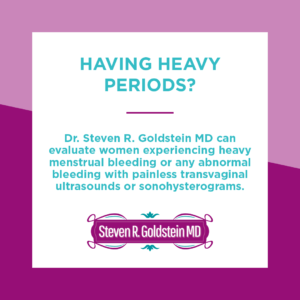Regarding heavy bleeding (menorrhagia), many women feel all the blood that comes out of their vagina is their “period.” Actually, a menses is a bleed that is preceded 14 days prior by ovulation. There are many normal and abnormal situations which may result in heavy menstrual bleeding. According to the CDC It is estimated that ten million American women have heavy periods (menorrhagia) each year.
Ovulation is the process whereby a mature egg is released from the ovary. This egg then moves down the fallopian tube where it will remain for twelve to twenty-four hours, where it can be fertilized. Ovulation typically occurs fourteen days before the beginning of the next menstrual period. However, this period varies from one woman to the next. Regular, cyclic menses is the hallmark of ovulation. There are thirteen lunar months in a calendar year, so if a woman gets a menses every twenty-eight days, that will be thirteen cycles in a calendar year.
Menorrhagia is menstrual bleeding that is heavy or lasts for more than a few days. It is defined as more than 80cc or 5 tablespoons in a period or more than the regular number of days.
The trouble is, what’s normal for one woman may be excessive for another, and women aren’t measuring their menses in a test tube. If your menses can be dealt with by a super-plus tampon, it’s probably within a normal range. Women who have always had three day periods where they never bled through a sanitary pad or a tampon, and all of a sudden the last two have lasted for seven days, ruining three pairs of pants, this is abnormal for them. Heavy or prolonged bleeding is very common, and it can come from a host of causes.

Schedule an Appointment with Dr. Goldstein Today!
Such heavy periods or vaginal bleeding must be distinguished from women who bleed at an irregular interval and irregular timing.
A woman can have abnormal bleeding – either heavy or at the wrong time or both – from cancer, hyperplasia, or polyps. Endometriosis, a disease in which the tissue from the lining of the uterus grows in other areas of the pelvis, is a very common cause of heavy and painful bleeding. A dysfunction of the hypothalamus, pituitary, or adrenal glands can cause heavy bleeding. So can thyroid problems.

For the diagnosis of heavy periods (menorrhagia) or other heavy bleeding, Dr Steven R. Goldstein recommends opting for painless, non-invasive Transvaginal Ultrasounds or Sonohysterograms as a first means of diagnosis. Dr Goldstein uses these technologies to see first hand the uterus, uterine lining, fallopian tubes, ovaries, cervix and more in order to properly diagnose the cause of heavy or unscheduled bleeding. Opt for these means of diagnoses first before enduring painful, inaccurate exploratory surgeries.
Doctor Steven R. Goldstein MD is a leading Gynecologist in practice for over 25 years at his office in Manhattan NYC. He is the Past President of the American College of Obstetrics and Gynecology (ACOG) New York Section, and Professor of Obstetrics and Gynecology at New York University School of Medicine. He is an internationally renowned expert in Gynecologic Ultrasounds. His ground breaking research in gynecology and transvaginal ultrasound has has had a significant influence on the way gynecology is practiced.
If you have any abnormalities of bleeding (whether it is heavy at the appropriate time or not heavy but at inappropriate times), do NOT have a painful endometrial biopsy as your first choice to diagnose your condition. Instead opt for painless evaluation with office procedures such as Transvaginal ultrasound or sonohysterography performed by Dr. Goldstein.
Avoid unnecessary surgical interventions like D&C’s or hysterectomies by having a painless transvaginal ultrasound by Dr. Goldstein, recipient of the 2018 Joseph H. Holmes Clinical Pioneer Award from the American Institute of Ultrasound in Medicine (AIUM). This is in recognition of Dr Goldstein’s distinguished career in ultrasound in medicine, and making outstanding contributions to the growth and development of medical ultrasound.
Please click the button below to schedule an appointment or call the office.
appointment requestTHIS WEBSITE DOES NOT PROVIDE MEDICAL ADVICE
The information on this site (or blog or article) is not a substitute for in office medical advice, diagnosis or treatment. The information is provided for informational or educational purposes only